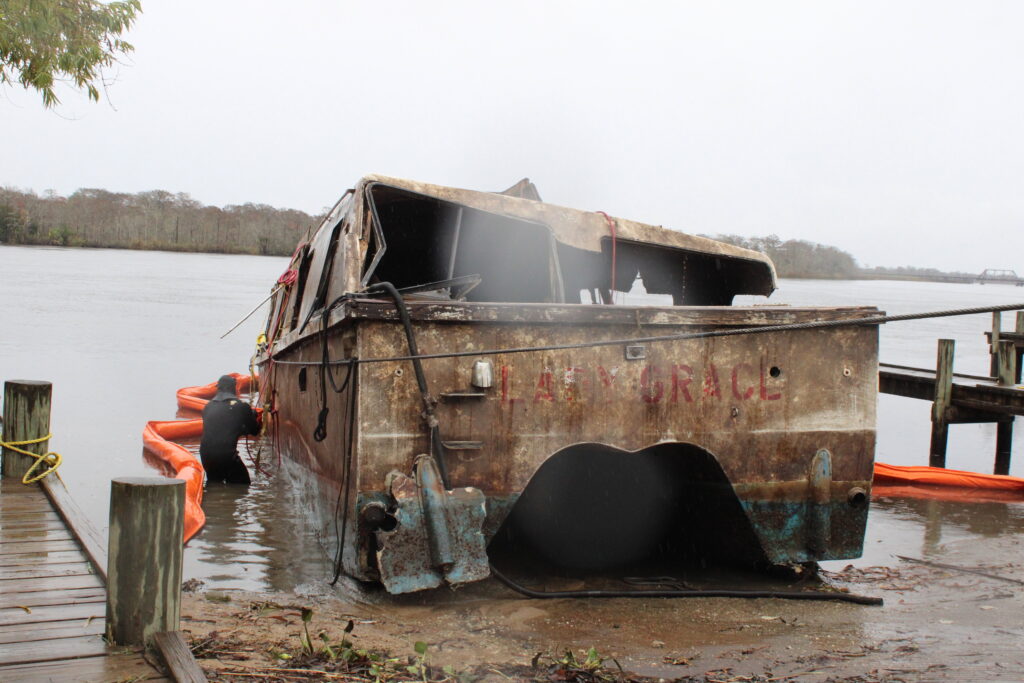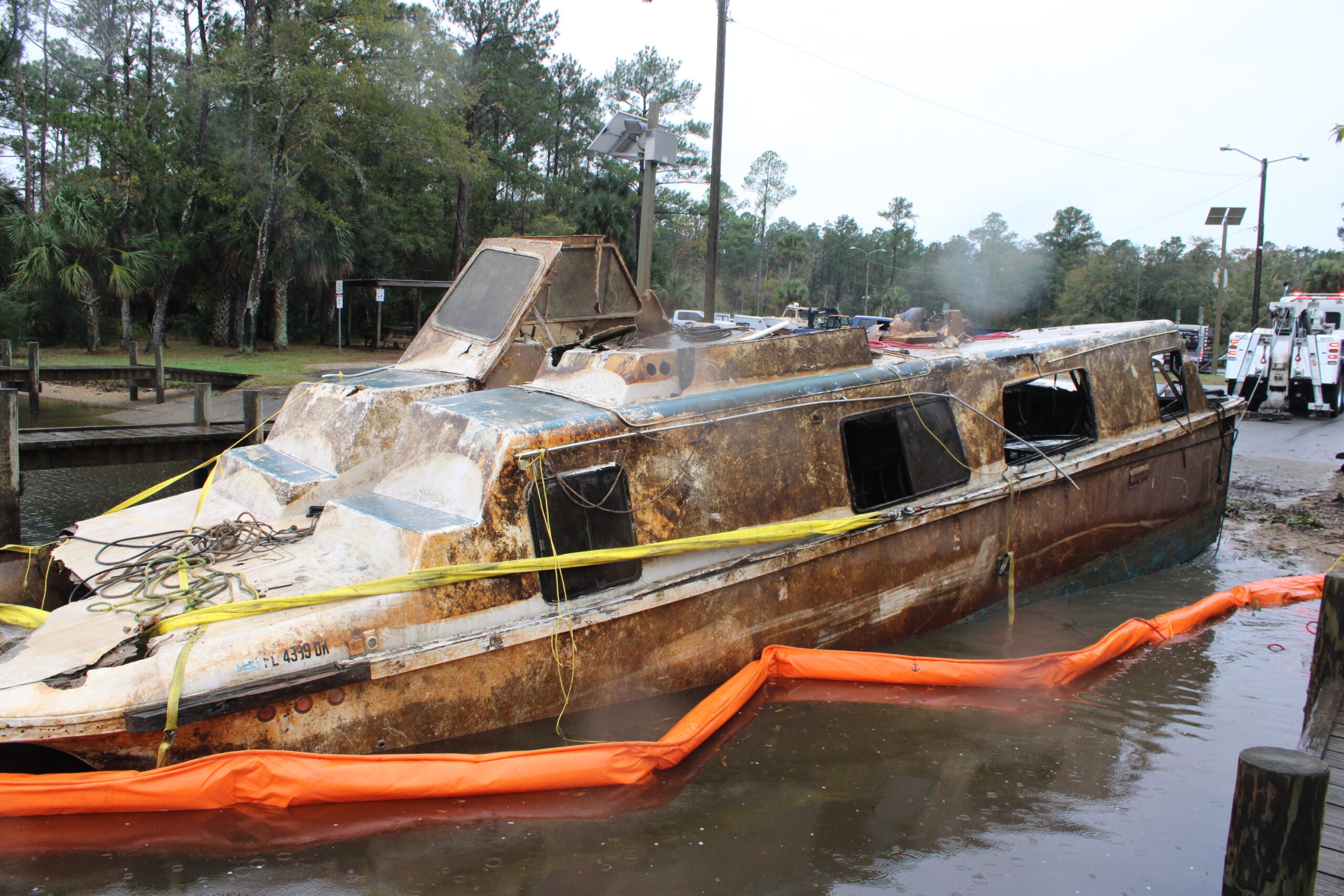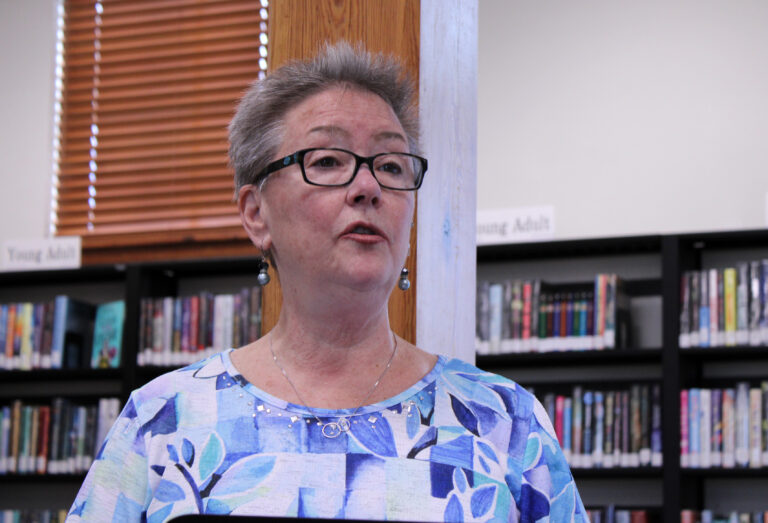Derelict vessel removal not always smooth sailing
It took over a year to get to the bottom of who was responsible for a derelict vessel that was impeding boat traffic around Pinhook in the Apalachicola River.
How long before that it had languished in the water is anybody’s guess. But based on the fact the chains intended to drag it up on shore at the Abercrombie boat ramp in Apalachicola sliced through the hull like a cheese wire through a wheel of Gouda, it had been a while.
On Dec. 16 , a chilly day with a steady rain, the vessel, whose name Lady Grace was faintly visible on the name board, was removed from state waters at the Abercrombie boat ramp by Divecom Marine, a licensed contractor out of Palmetto under contract with the state.
Zachary Frame, in charge of the removal operation for Divecom, said the combination of bad weather and a frame so softened that it could not be pulled up onto the asphalt ramp area, made for a difficult process.
The firm’s divers, of which Frame is one, had to get underneath the boat and raise it and its six tons of mud to the surface, and then tow the wreckage to the dock where it could be pulled out for proper disposal.
After working all morning to drag it in one piece onto dry land, Frame and his crew conceded a back hoe would be needed to smash the wreckage into scoopable chunks that could be placed in Dumpsters for transport to the landfill.
“That was probably one of the hardest ones I’ve done all year,” he said last month. “With the vessel being in the condition it was, how long it had been in the water had jeopardized the hull.
“Pretty much everything that could go wrong did,” Frame said. “It was extremely brittle and the river had filled it with mud.”

Ashley Sklute, a spokeswoman for the Florida Fish and the Conservation Commission, said the cost for removal was about $30,222 paid for by FWC’s derelict vessel program.
But because of the extensive work needed to meet the state’s stringent removal requirements, Divecom’s competitive bid meant the job ended up costing the company money.
“It’s the nature of the beast,” Frame said. “You win some and you lose some.”
Following a yearlong investigation of the origins of the vessel that began Sept. 22, 2022, FWC determined it was last owned by Trapper Lane Nunnery of Wewahitchka.
“It is unclear how long the vessel was in the water prior to that,” said Sklute. “Mr. Nunnery will be responsible for repaying the state in full, or will face losing his ability to register vessels and motor vehicles in the state of Florida.”
While Frame said he couldn’t be sure, he speculated the owner might have taken it to a deeper part of Pinhook, and then scuttled it thinking it would sink entirely out of sight.
Sklute said there are seven active derelict vessel cases in Franklin County, three of which are pending removal and four under investigation. In Gulf County there are six active cases, four pending removal and two under investigation.
“Before a derelict vessel can be removed and disposed of, the law enforcement investigation must be completed and approved for removal by the law enforcement area captain,” she said. “Once the area captain authorizes the removal, the vessel is categorized as pending removal, and the actual vessel removal process begins.”
FWC works with municipal governments to have these vessels removed from state waters through the FWC Derelict Vessel Grant Program, which provides local governments complete reimbursement for eligible vessels that they remove, after a grant with that entity has been fully executed, she said.
In this case, FWC operated under its authority within the Derelict Vessel Direct Removal Program to contract directly with an approved contractor, Divecom, to remove the vessel from state waters, outside of the grant program.
“The FWC makes every effort to work with the vessel owners to have them either remove the vessel from state waters themselves or return it to non-derelict status to minimize the cost to taxpayers,” Sklute said.
In an attempt to prevent derelict vessels from occurring, FWC initiated the Florida Vessel Turn in Program, whereby vessel owners may apply to have their At-Risk vessels removed from the waters of this state at no charge to them.
Guidelines and Application are available at FloridaVTIP.com. Vessel owners who have received a citation or written warning for an At-Risk condition by law enforcement may apply for this program if they meet eligibility requirements.






I’m wondering if John Clark’s experiment would be considered a dere;ict vessel, or a dera;ict house?